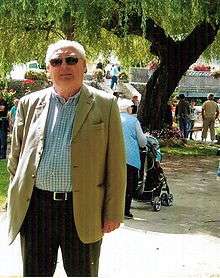Bernard Bonnejean
Bernard Bonnejean (born 10 June 1950 in Ernée, Mayenne), is a French author, specialist of catholic French poetry of 19th and 20th centuries.

Youth
Bernard Bonnejean is the last of eight children of a family of Picardy’s origin. In 1959 the family moved to Le Mans where the father, Maurice, is ironsmith to Arsenal, then clerk after retirement. The family settled in 1965 in Mayenne.
Professorship
After earning his baccalauréat, Bernard Bonnejean works as a teacher and middle school professor in Catholic education. He's licencié es Lettres, Bachelor of Arts, and certified teacher of modern literature, in Saint-Pierre-la-Cour. He finished his career as a teacher in a secondary school in Laval, Mayenne as an Agrégé de Lettres modernes. He earned the title of Doctor after leaving education.[1]
He was secretary of the Association Mayennaise d’échanges et de partage (AMEP) from 1975 to 2001, to finance the apprenticeship of young Cameroonian mothers, founder and president of the Association Lycée en Poésie.
Writer and researcher
Bernard Bonnejean expressed in 1996 about the true catholicism of Paul Verlaine. Particularly, he examines the work of catholic Joris-Karl Huysmans and poetry of Therese of Lisieux.[2] His thesis entitled Les Poètes catholiques français de Verlaine à Péguy, 1870-1914 (The French-Catholics Poets from Verlaine to Péguy, 1870-1914), is sustained in 2003 in the University of Rennes 2 - Upper Brittany.
Works and articles
• “Liturgies intimes, un recueil à redécouvrir”, ("Liturgies intimes, a collection to rediscover"), in Spiritualité verlainienne, Actes du colloque international de Metz (novembre 1996), (Proceedings of International Symposium of Metz Metz (November 1996), Klincksieck, 1997 (ISBN 2-252-03171-9).
• "Le Verlaine de Guy Goffette", in Revue Verlaine n° 5, 1997.
• "Huysmans avant À Rebours : les fondements nécessaires d'une quête en devenir", in Le Mal dans l'imaginaire français (1850–1950), éd. David et L'Harmattan, 1998 (ISBN 2-7384-6198-0) ; "Huysmans before A Rebours: The necessary foundation for a quest to become", The evil in the French imaginary (1850–1950), Ed. David and L'Harmattan, 1998 (ISBN 2-7384-6198-0)
• Les Poètes français d'inspiration catholique (1870–1914), The French inspired Catholic poets (1870–1914), 2 vol., (695p.), thèse de doctorat, Université de Rennes-II, 2003 ; Lille : Atelier national de reproduction des thèses, 2004.
• Poésie thérésienne, (Poetry of Therese), Preface Constant Tonnelier, Éditions du Cerf, Paris, 2006, II-292 p., (ISBN 978-2-204-07785-9), (FRBNF 40238743k).
The thesis is published in three volumes
• Clio et ses poètes, Clio and her poets : the Catholic poets in history, 1870-1914, with a foreword by Don Bertrand Gamelin, Éditions du Cerf, Paris, 2007, 354 p., (ISBN 978-2-204-08052-1)
• Le Dur Métier d’apôtre, The hard work of Apostle : Catholic poets to discover a real authenticity, 1870-1914, with a preface by Olivier Bourdelier, Éditions du Cerf, Paris, 2009, 320 p., (ISBN 978-2-204-08053-8), (FRBNF 42011100g).
• Les Chemins d'un Éden retrouvé, Paths of Paradise Found, Forthcoming.
External links
References
- ↑ See Education in France
- ↑ « Her writings also include 54 Poésies, some of which have great theological and spiritual depth inspired by Sacred Scripture. Worthy of special mention are Vivre d'Amour!... (Poésies 17) and Pourquoi je t'aime, ô Marie! (Poésies 54), an original synthesis of the Virgin Mary's journey according to the Gospel. To this literary production should be added eight Récréations pieuses: poetic and theatrical compositions, conceived and performed by the Saint for her community on certain feast days, in accordance with the tradition of Carmel. Among those writings should be mentioned a series of 21 Prières” HIS HOLINESS POPE JOHN PAUL II, DIVINI AMORIS SCIENTIA, "SAINT THÉRÈSE OF THE CHILD JESUS AND THE HOLY FACE IS PROCLAIMED A DOCTOR OF THE UNIVERSAL CHURCH", Given in Rome, at St Peter's, under the Fisherman's ring, the 19th day of the month of October in the year of the Lord 1997, the 20th of the Pontificate. Copyright © Libreria Editrice Vaticana.